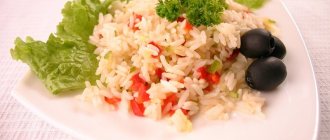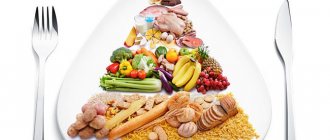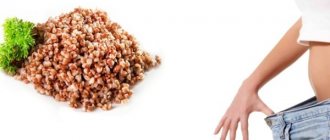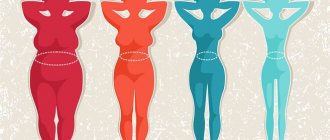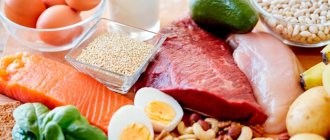Psoriasis is a chronic non-infectious skin disease accompanied by rashes and peeling of the skin.
In the acute stage of the disease, a diet can significantly alleviate the patient’s condition and remove the symptoms of the disease within a few days.
The main objectives of therapeutic nutrition are:
- Ensuring a constant acid-base balance
- Coherence of metabolic processes
- Mobilization of the body's defenses
- Normalization of the gastrointestinal tract.
Alkali-forming products
- Fruits (exception: cranberries, currants, prunes, plums, blueberries) –
· apples, melons and bananas cannot be eaten with other foods, only as a separate meal,
· Do not consume citrus fruits and their juices with whole grains and dairy products.
- Vegetables (exception: legumes, rhubarb, pumpkin, Brussels sprouts - you can eat them in small quantities). Completely exclude from the diet all vegetables of the nightshade family: tomatoes, potatoes, peppers, eggplants!
Also increases alkalinity:
· Adding lecithin to food and drinks. · Freshly squeezed lemon juice in a glass of hot or cold water. · Juices of grapes, pears, apricots, papaya, mango, pineapple, grapefruit and orange. · Fresh and stewed fruits. · Fresh vegetable juices (carrots, celery, beets, parsley, spinach, onions). · 3-5 drops of glycothymoline in a glass of clean water before bed 5 days a week (alkaline mineral waters are recommended as an alternative: Borjomi, Essentuki-4, Smirnovskaya, etc.). · Empty the bowels 2-1 times a day. · Exercise and mobility. · Positive emotions.
Acid-forming products
These are products containing proteins, starches, sugars, fats and oils, i.e. - meat, grains, cheese, sugar, potatoes, dried peas, beans, oils, cream, meat products. Their combinations in large quantities create an acid reaction in the blood, thereby worsening the condition of patients with psoriasis.
Exclude if possible:
· combining several acid-forming foods during one meal: starch and sweets, protein and meat products, meat or fatty products with sugars or a lot of starches; · sugar and products containing it; · most types of vinegar; · products with preservatives, artificial additives, dyes, etc.; · alcohol; · drug overdose; Irregular bowel movements, constipation; · inactivity (mental and physical); · negative emotions.
Dr. Pegano and his theory
A graduate of the Lincoln College of Osteopathy, dermatologist John Pegano, who developed a new method for curing the disease. Specific and phased nutrition, rational acid and alkaline balance in the body. This is the main essence of such a diet. Alkaline food should exceed acidic food, 70% to 30%. Book “Treatment of psoriasis. The Natural Way” emphasizes that the occurrence of eczema is accompanied by problems with the intestines, as well as its “pollution.” The John Pegano diet for psoriasis is the only non-drug treatment.
Foods and drinks that Dr. Pegano recommends for people with psoriasis
So, let's take a closer look at the foods and drinks that Dr. Pegano recommends for people suffering from psoriasis and psoriatic arthritis.
He believes that 70-80% of the daily diet should consist of foods such as:
· Water: 6-8 glasses of clean water daily in addition to other liquids you drink.
· Lecithin (granulated): 1 table. spoon 3 rubles per day, 5 days a week.
· Fruits are preferably fresh, fresh frozen, steamed, rarely canned.
Recommended fruits are: apples (baked), apricots, most berries, cherries, dates, figs, grapes, grapefruit, lemon, lime, mango, nectarine, orange, papaya, peaches, pineapples, prunes (small), raisins, kiwi.
Avocados, cranberries, currants, plums and prunes (large) can be eaten in small quantities.
Raw apples, bananas and melons are allowed if eaten separately from other foods and in small quantities.
Vegetables are preferably fresh, fresh frozen, steamed, and rarely canned.
Recommended vegetables: asparagus, beets, broccoli, Brussels sprouts, cabbage, carrots, celery (stem), cucumber, garlic, lettuce, romaine, onions, olives, parsnips, pumpkin, shallots, spinach, sprouts, capsicum beans, zucchini, sweet potatoes, yams, watercress.
Possible in small quantities: corn, dried beans, peas, lentils, rhubarb, mushrooms. Nuts – almonds, rarely – hazelnuts.
Recipes for cooking
The Pegano diet for psoriasis includes the following recipes:
- Onion soup with apples. To prepare the dish you will need fresh onions, apples, vegetable oil, and clean water. Heat a few tablespoons of vegetable oil in a thick-bottomed pan, add finely chopped onion, fry it until golden brown. After this, pour 2 liters. water, bring the soup to a boil. After the water boils, add 2 apples, cut into cubes or slices, cook for 5 - 10 minutes, add a little salt. When serving, sprinkle with herbs.
- Pegano’s detailed diet for psoriasis includes many dishes. One of them is soup with rice, broccoli and chicken. To prepare the chicken, cut it into small pieces and boil until half cooked. After this, add broccoli, rice, a little olive oil to the soup, and cook the food until fully cooked. Before serving, add parsley and celery.
When on a diet for psoriasis, you can eat salmon. Fish is prepared by boiling, stewing or baking. It is recommended to add fish to soups. The beneficial components of salmon saturate the body with microelements and phosphorus, which promotes a speedy recovery.
Reviews about the Pegano diet for psoriasis are positive. Strict adherence to the doctor’s recommendations helps to quickly get rid of skin rashes and maintain a period of remission for a long time.
20-30% of the daily diet should consist of foods such as:
Cereals - by weight, barley, millet, buckwheat, rye (porridges made from them), bran, wheat - whole, crushed, flakes, crispbread, sprouts, corn and corn flour, rice (brown and wild), whole seeds - pumpkin, sesame , sunflower, flax, pasta (without using white flour).
Fish at least 4 times a week, never fry ! Tuna, bluefish, cod, mackerel, coryphaena, flounder, haddock, halibut, perch, salmon, sardines, sole, sturgeon, swordfish, trout, whitefish, sushi.
Poultry - chicken, turkey, partridge, lean game (all without skin, white meat is preferable), 2-3 times a week.
Meat - only lamb, separated from fat, well cooked (1-2 times a week), never fry, eat 110-170g at a time.
Dairy . Milk (reduced fat, skim), buttermilk, powdered milk, goat milk, soy milk, almond milk, butter, reduced fat margarine, cheese (reduced fat and salt), cottage cheese and processed cheese (reduced fat and salt), kefir, plain yogurt (low-fat, low-fat).
Eggs only soft-boiled or hard-boiled, 2-4 times a week.
Oil - olive, rapeseed, sunflower, corn, cottonseed, soybean, almond, and occasionally sesame. 1 teaspoon 3 times a day is acceptable.
Teas. Tea made from chamomile, mullein, watermelon seeds.
Products not recommended by John Pegano:
Berries and fruits: strawberries, strawberries (citrus fruits - for psoriatic arthritis).
Vegetables: all nightshades - tomatoes, tobacco, eggplants, peppers, potatoes, paprika.
Cereals: White bread and all products made with white flour.
Fish: anchovies, herring, salmon, caviar, crustaceans (crabs, lobsters, shrimp), shellfish (mussels, oysters, scallops, squid), crustacean sauces, fish baked in batter or breadcrumbs, fried, marinated or smoked.
Poultry: fatty poultry (duck, goose), poultry skin, fried, smoked, baked with lots of spices, in batter or breadcrumbs, not boiled.
Meat: beef, pork, veal and everything prepared from them: hamburgers, sausages, sausages, ham, sausages, entrails (heart, kidneys, brains, liver, etc.), inclusion of starchy foods in the same meal with lamb.
Dairy: All dairy products are high in fat.
Yeast or yeast products.
Coffee: no more than 3 cups per day (in case of severe addiction), only black decaffeinated.
Other: All fried foods, pizza, alcohol, sweet cereals, vinegar, marinades, smoked meats, hot spices, coconut, palm oil.
It must be remembered that some foods should not be combined in the same meal; it is advisable to eat them separately.
Is it possible to use honey for psoriasis?
Patients with psoriasis should not eat easily digestible carbohydrates. Honey is one of these products. Although this is a very healthy sweet, which contains a number of substances important for the body, in this case it is better to avoid it. According to Pegan's nutritional principles, honey is a prohibited food. Therefore, you will have to replace it with other sweets.
Honey is one of the products to which allergic reactions often occur. With psoriasis, such phenomena cannot be allowed. After all, allergies, like any other disease, negatively affect the general condition of the body. Although honey is rich in vitamin B and has a laxative effect, this does not make it beneficial for psoriasis. In addition, there are many products with similar properties.
Despite the fact that honey cannot be included in the diet, it is used for external use. This sweet product, combined with egg white, celandine, petroleum jelly and baby cream, makes an excellent ointment. It is applied to clean skin. As a result, pain and itching disappear, peeling decreases. However, do not forget that if you are allergic to honey, it can manifest itself even with external use of this product.
Author of the article:
Kuzmina Vera Valerievna |
Endocrinologist, nutritionist Education: Diploma of the Russian State Medical University named after. N.I. Pirogov, specialty “General Medicine” (2004). Residency at the Moscow State Medical and Dental University, diploma in Endocrinology (2006). Our authors
What not to do?
· Do not combine whole grains, e.g. porridge, bread, etc. with fruits, citrus juices or stewed and dried fruits.
· Do not combine citrus fruits and their juices with dairy products such as cheese, milk and yogurt.
· Do not combine any fruits with white flour products: bread, cereals, pasta, etc.
· Do not combine melons, raw apples, bananas with other foods. Do not add milk, cream or sugar to coffee or tea.
· Do not combine too many acid-forming foods (proteins, some starches, sugars, fats and oils) in the same meal.
· Red or white wine can be drunk occasionally (55-110 g).
· Overeating is never allowed, even on foods that are allowed.
Dr. Pegano's regimen
In addition to diet, Dr. Pegano recommends sticking to a specific routine. Here are the main components of the lifestyle of a psoriasis patient:
· Daily consumption, as mentioned above, is 6-8 glasses of pure water daily in addition to other liquids drunk before and after meals. The cleaner the water, the better.
· Use of natural laxatives. The best natural laxatives are fresh fruits and vegetables. Also, foods rich in vitamin B help cleanse the intestines. The following foods are rich in vitamin B: wheat germ, brewer's yeast, whole grain barley, soy milk, buckwheat, raw peas, egg yolks, rye bread, almonds, fish, poultry, honey, turnips, beets, green leafy vegetables and broccoli.
· Olive oil, taken alone, is a very practical and effective laxative. Take half a teaspoon of olive oil 3-4 times a day until you have a good bowel movement.
· Include fiber-rich foods as much as possible in your daily diet. They cleanse the colon due to their inability to be completely digested. Fiber-rich foods include whole grain bread, whole grain cereals, fresh fruits, vegetables and almonds.
· Be sure to take steam baths to cleanse and stimulate the skin.
· Find time for exercise! Physical education, especially outdoors, brings significant benefits.
· Try never to overeat.
· A correct and positive attitude is very important, because negative, destructive thoughts contribute to the production of oxidizing toxins.
Psoriasis - theories of origin
Based on modern literature data on the etiology and pathogenesis of psoriasis, we can come to the conclusion that there are currently several complementary concepts of psoriasis based on the study of autoimmune processes, the nervous system, the state of internal organs, microcirculation, and provoking environmental stimuli in psoriasis.
Among the many theories of the occurrence of psoriasis, one of the main ones is currently considered the hereditary theory of psoriasis, which is based on cases of familial manifestation of this dermatosis with a high risk of severity of the disease in the first two decades of life. However, being multifactorially inherited, psoriasis is not, strictly speaking, a hereditary disease. Today, there are two epidemiological forms of psoriasis: type I and type II.
Type I psoriasis is associated with the human lymphocyte antigen system (HLA markers were detected in 85.3% of cases). It is characterized by nepotism. The course of the disease in type I psoriasis is in most cases more severe than in type II, and has a pronounced tendency to generalize the process.
Type II psoriasis is associated with late onset (over 40 years of age) and is sporadic. There is no clear connection with the HLA system. There is no familial incidence of the disease. Unlike the first type, lesions of the nails and joints are more common.
Another generally accepted theory of the occurrence of psoriasis is the immune one. This, in addition to inflammatory changes in blood vessels and an infiltrate of activated T-lymphocytes and macrophages, includes focal accumulations of granulocytes, as well as an increase in epidermal proliferation of keratinocytes. Due to the predominance of epidermal hyperproliferation and accumulation of granulocytes, the cause of psoriasis has long been sought in a functional disorder of keratinocyte growth, neutrophil activity or arachidonic acid metabolism, and as a result, these studies occupy a significant part in the pathogenesis of the disease.
Often, the initial signs of sporadically occurring psoriasis can be compared with some kind of psycho-traumatic situations, although most authors are of the opinion that psoriasis is not a fully psychosomatic disease.
Disorders in the internal organs are considered as a separate part in the pathogenesis of psoriasis. First of all, this concerns chronic foci of infection (chronic tonsillitis, chronic sinusitis, etc.), disorders of the gastrointestinal tract (liver, gall bladder, large intestine).
Based on all of the above, psoriasis, being a polyetiological disease, requires the same multifaceted approach in its treatment.
Sources
- Katsimbri P., Korakas E., Kountouri A., Ikonomidis I., Tsougos E., Vlachos D., Papadavid E., Raptis A., Lambadiari V. The Effect of Antioxidant and Anti-Inflammatory Capacity of Diet on Psoriasis and Psoriatic Arthritis Phenotype: Nutrition as Therapeutic Tool? // Antioxidants (Basel) - 2021 - Vol10 - N2 - p.; PMID:33499118
- Castaldo G., Pagano I., Grimaldi M., Marino C., Molettieri P., Santoro A., Stillitano I., Romano R., Montoro P., D'Ursi AM., Rastrelli L. Effect of Very-Low -Calorie Ketogenic Diet on Psoriasis Patients: A Nuclear Magnetic Resonance-Based Metabolomic Study. // J Proteome Res - 2021 - Vol20 - N3 - p.1509-1521; PMID:33164516
- Barrea L., Megna M., Cacciapuoti S., Frias-Toral E., Fabbrocini G., Savastano S., Colao A., Muscogiuri G. Very low-calorie ketogenic diet (VLCKD) in patients with psoriasis and obesity: an update for dermatologists and nutritionists. // Crit Rev Food Sci Nutr - 2021 - Vol - NNULL - p.1-17; PMID:32969257
- Winiarska-Mieczan A., Mieczan T., Wójcik G. Importance of Redox Equilibrium in the Pathogenesis of Psoriasis-Impact of Antioxidant-Rich Diet. // Nutrients - 2021 - Vol12 - N6 - p.; PMID:32575706
- Wu AG., Weinberg JM. Correction: The Impact of Diet on Psoriasis. // Cutis - 2021 - Vol104 - N4 - p.241; PMID:31774892
- Wu AG., Weinberg JM. The impact of diet on psoriasis. // Cutis - 2021 - Vol104 - N2S - p.7-10; PMID:31634384
- Macklis P., Adams KM., Li D., Krispinsky A., Bechtel M., Trinidad J., Kaffenberger J., Kumar P., Kaffenberger BH. The impacts of oral health symptoms, hygiene, and diet on the development and severity of psoriasis. // Dermatol Online J - 2019 - Vol25 - N7 - p.; PMID:31450285
- Korovesi A., Dalamaga M., Kotopouli M., Papadavid E. Adherence to the Mediterranean diet is independently associated with psoriasis risk, severity, and quality of life: a cross-sectional observational study. // Int J Dermatol - 2021 - Vol58 - N9 - p.e164-e165; PMID:31168780
- Pona A., Haidari W., Kolli S.S., Feldman S.R. Diet and psoriasis. // Dermatol Online J - 2021 - Vol25 - N2 - p.; PMID:30865402
- Molina-Leyva A., Cuenca-Barrales C., Vega-Castillo JJ., Ruiz-Carrascosa JC., Ruiz-Villaverde R. Adherence to Mediterranean diet in Spanish patients with psoriasis: Cardiovascular benefits? // Dermatol Ther - 2021 - Vol32 - N2 - p.e12810; PMID:30632241

